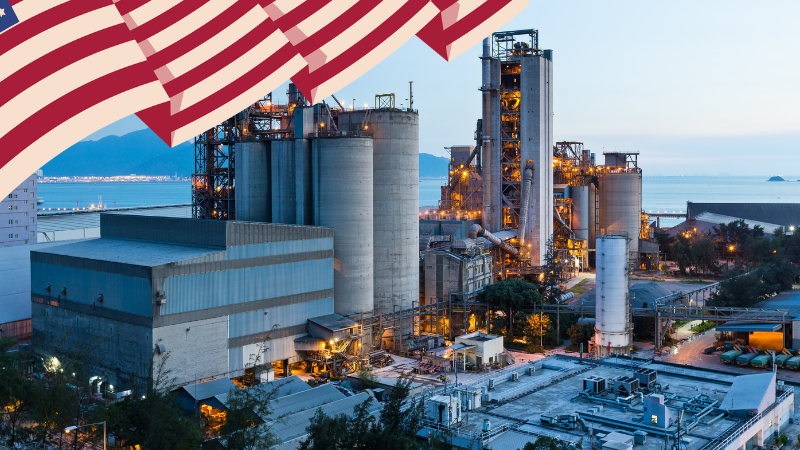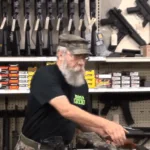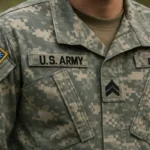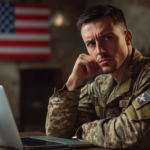Gun violence is one of the most emotionally charged and divisive issues in the United States. It sparks debates that touch on public safety, constitutional rights, and the ethics of corporate responsibility.
But today, I want to focus on something that doesn’t often make headlines: how the Protection of Lawful Commerce in Arms Act (PLCAA) shields the firearms industry from civil liability.
With incidents like the recent tragedy at Apalachee High School in Georgia, where four lives were lost to gun violence, it’s impossible not to question how the legal system protects the industry behind the tools of such devastation.
Are the current laws balanced, or are they weighted too heavily in favor of corporations at the expense of victims?
Overview
The PLCAA, passed in 2005, was designed to protect gun manufacturers and sellers from civil lawsuits when their firearms are used in crimes. At first glance, this might seem reasonable—why should a company be held liable for a crime it didn’t directly commit?
But there’s a deeper layer to this discussion that reveals the unintended (or perhaps intended) consequences of such sweeping immunity.
Key Features of the PLCAA:
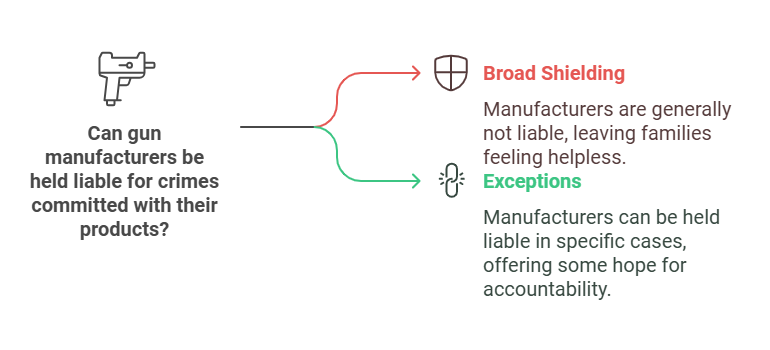
- Broad Shielding: Gun manufacturers and dealers cannot generally be held liable for crimes committed with their products.
- Exceptions: There are some carve-outs, such as cases involving defective products or violations of state laws.
The law has left many families of gun violence victims feeling helpless. Imagine losing someone you love to a shooting, only to find out that you have no legal avenue to hold the industry accountable for irresponsible practic
The Origins of the Shield
The PLCAA didn’t emerge in a vacuum. In the 1990s and early 2000s, a wave of lawsuits was filed against gun manufacturers, arguing they should be held accountable for unsafe products and irresponsible marketing practices according to NPR.
This created panic in the firearms industry, which lobbied hard for legal protection. The result? Congress passed the PLCAA, offering gunmakers a level of immunity unheard of in most other industries.
Compare this to the tobacco or pharmaceutical industries. These sectors have faced numerous lawsuits for public health crises they contributed to, such as lung cancer and the opioid epidemic.
Why should firearms, a product designed to cause harm when used as intended, be the exception?
Recent Developments: Cracks in the Armor
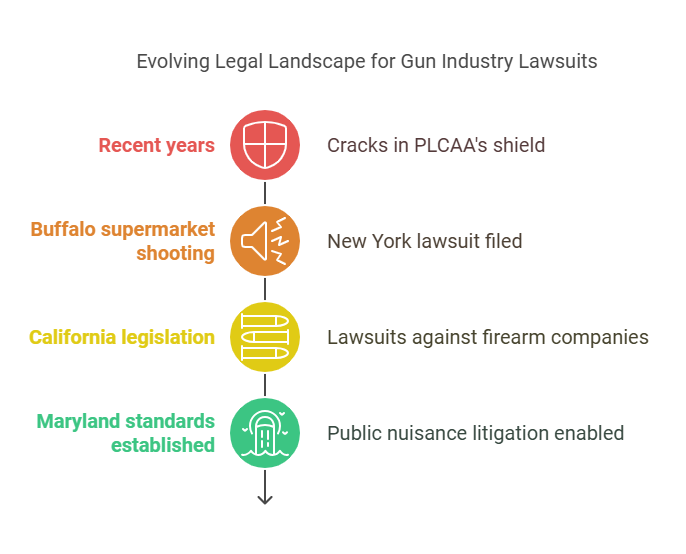
In recent years, cracks have started to appear in the PLCAA’s shield. Several states have passed laws creating pathways to sue the gun industry under certain circumstances. Let’s take a closer look at these developments:
State-Level Legislation
- New York: Allows lawsuits against gunmakers for creating a “public nuisance.” After the Buffalo supermarket shooting, the city sued multiple gun manufacturers as noted by Washington Post.
- California: Passed laws explicitly permitting lawsuits against firearm companies.
- Maryland: Established standards for the firearm industry and enabled “public nuisance” litigation.
High-Profile Cases
The 2019 Supreme Court decision to allow a lawsuit against Remington Arms Co. marked a turning point. The case, brought by families of Sandy Hook victims, argued that Remington’s marketing targeted young males prone to violence. This lawsuit settled for $73 million, sending a clear message: gunmakers are not untouchable.
International Echoes
Even outside the U.S., the PLCAA’s effects are being challenged. BBC states that the Mexican government filed a $10 billion lawsuit against American gun manufacturers, claiming their negligence contributed to cartel violence. Though not fully successful, the case highlights how far-reaching the firearms industry’s influence can be.
The Ethics of Corporate Responsibility
One of the most striking aspects of this issue is the ethical question: Should corporations be immune from the consequences of how their products are used?
The firearms industry often argues that holding them accountable is unfair because guns are legal products. But critics point out that other industries have been held liable for negligence, even when their products were misused.
Lessons from Other Industries:
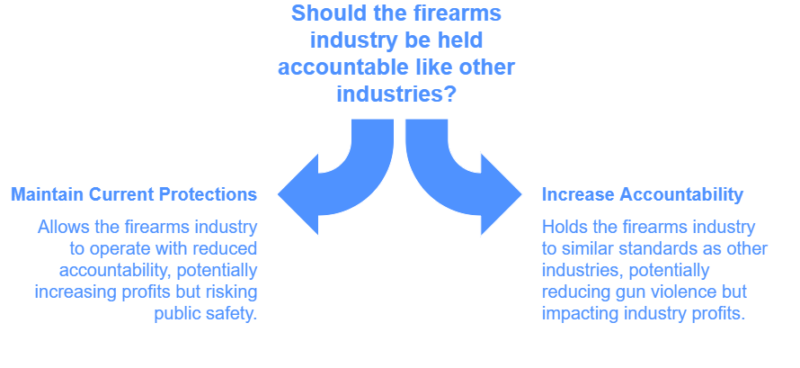
- Big Tobacco: Sued for misleading consumers about the health risks of smoking.
- Pharmaceutical Companies: Held accountable for deceptive practices that fueled the opioid crisis.
- Automotive Industry: Frequently sued for defects that lead to accidents.
The firearms industry has largely avoided such scrutiny, despite the devastating consequences of gun violence. The PLCAA effectively creates a safety net that allows the industry to profit while sidestepping accountability.
Beyond Lawsuits: Community-Based Solutions
While legal strategies are essential, they’re not the only way to address gun violence. Many organizations are working on community-based approaches that focus on prevention without resorting to increased policing or incarceration.
Examples of Successful Programs:
- Save Our Streets: Employs community leaders to mediate conflicts and prevent shootings.
- Man Up!: Focuses on mentoring and providing resources to at-risk youth.
Programs like these tackle the root causes of violence, from poverty to lack of educational opportunities. They offer a way forward that doesn’t rely solely on punitive measures.
A Path Forward: Balance and Accountability
So, how do we move forward? It’s not about dismantling the firearms industry but about ensuring it operates responsibly. Striking a balance means:
- Strengthening Regulations: Implementing universal background checks and banning the sale of firearms that can be easily modified into machine guns.
- Holding Manufacturers Accountable: Expanding state laws that allow lawsuits under specific circumstances.
- Investing in Prevention: Funding community programs that address the underlying causes of gun violence.
Empowering Change Through Consumer Advocacy
Holding powerful industries accountable often requires more than just laws—it also demands active consumer engagement. Organizations like ConsumerShield play a vital role in empowering individuals to understand their rights and push for corporate responsibility.
By providing resources and advocacy tools, platforms like this can help amplify voices and drive meaningful change in industries that have long avoided scrutiny.
Final Thoughts
The PLCAA was born out of fear—fear that the firearms’ industry would crumble under a wave of lawsuits. But protecting corporations at the expense of accountability has left victims and communities bearing the cost of gun violence. It’s time to reconsider the role of laws like the PLCAA and push for changes that prioritize public safety over profit margins.
Accountability isn’t about punishing lawful gun owners or dismantling a legal industry; it’s about ensuring that everyone, from manufacturers to policymakers, plays their part in reducing the toll of gun violence.

